
Otto Abels Harbach, born Otto Abels Hauerbach was an American lyricist and librettist of nearly 50 musical comedies and operettas. Harbach collaborated as lyricist or librettist with many of the leading Broadway composers of the early 20th century, including Jerome Kern, Louis Hirsch, Herbert Stothart, Vincent Youmans, George Gershwin, and Sigmund Romberg. Harbach believed that music, lyrics, and story should be closely connected, and, as Oscar Hammerstein II's mentor, he encouraged Hammerstein to write musicals in this manner. Harbach is considered one of the first great Broadway lyricists, and he helped raise the status of the lyricist in an age more concerned with music, spectacle, and stars. Some of his more famous lyrics are "Smoke Gets in Your Eyes", "Indian Love Call" and "Cuddle up a Little Closer, Lovey Mine".
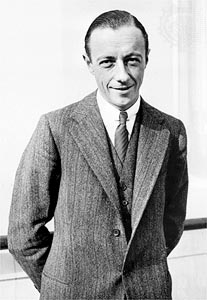
Vincent Millie Youmans was an American Broadway composer and producer.

Rose-Marie is an operetta-style musical with music by Rudolf Friml and Herbert Stothart, and book and lyrics by Otto Harbach and Oscar Hammerstein II. The story is set in the Canadian Rocky Mountains and concerns Rose-Marie La Flemme, a French Canadian girl who loves miner Jim Kenyon. When Jim falls under suspicion for murder, her brother Emile plans for Rose-Marie to marry Edward Hawley, a city man.

The Imperial Theatre is a Broadway theater at 249 West 45th Street in the Theater District of Midtown Manhattan in New York City. Opened in 1923, the Imperial Theatre was designed by Herbert J. Krapp and was constructed for the Shubert brothers. It has 1,457 seats across two levels and is operated by The Shubert Organization. The auditorium interior is a New York City designated landmark.
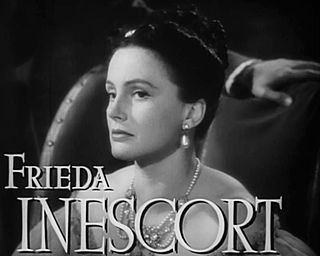
Frieda Inescort was a Scottish-born actress best known for creating the role of Sorel Bliss in Noël Coward's play Hay Fever on Broadway. She also played the shingled lady in John Galsworthy's 1927 Broadway production Escape and Caroline Bingley in the 1940 film of Jane Austen's Pride and Prejudice.
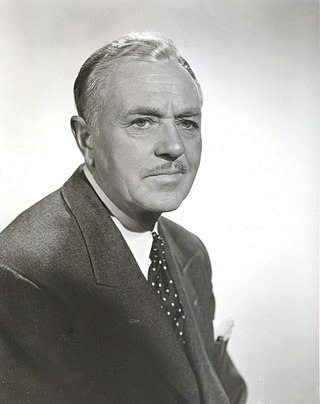
Stanley Charles Ridges was an English-born, American actor who made more than 100 appearances in theatre and movies from 1917 to 1951.

J. Harold Murray was an American baritone singer and actor. For more than a decade, during the Roaring Twenties and the Depression Thirties, he contributed to the development of musical theater by bridging vaudeville, operetta and the modern American musical. The most popular American songs he introduced on Broadway included "Autumn in New York" ; "Let's Have Another Cup of Coffee" and "Soft Lights and Sweet Music" ; "Rio Rita", "The Kinkajou" and "The Rangers Song" ; and "Mandalay".
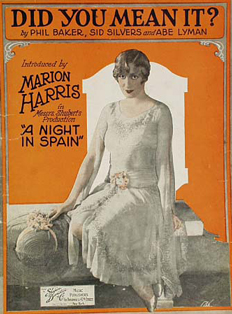
A Night in Spain is a musical revue with a book by Harold R. Atteridge, music by Jean Schwartz and lyrics by Al Bryan. Additional music and lyrics were contributed by Phil Baker, Sid Silvers and Ted Healy. The revue was presented on Broadway in 1927 for a total of 174 performances.
The Garden Theatre was a major theatre on Madison Avenue and 27th Street in New York City, New York. The theatre opened on September 27, 1890, and closed in 1925. Part of the second Madison Square Garden complex, the theatre presented Broadway plays for two decades and then, as high-end theatres moved uptown to the Times Square area, became a facility for German and Yiddish theatre, motion pictures, lectures, and meetings of trade and political groups.

Tickle Me was a Broadway musical comedy in two acts with book and lyrics by Oscar Hammerstein II, Otto Harbach and Frank Mandel and music and musical direction provided by Herbert Stothart. Tickle Me was produced by Arthur Hammerstein and opened at the Selwyn Theater on August 17, 1920 and closed after 207 performances on February 12, 1921. The musical then embarked on a successful road tour with a schedule that extending well into the spring of the following year.
Hold On To Your Hats is a musical comedy in two acts by Guy Bolton, Matt Brooks, and Eddie Davis, with lyrics by E. Y. Harburg and music by Burton Lane. The show was lavishly staged by Edgar MacGregor, with dances by Catherine Littlefield, musical direction by Al Goodman, and colorful settings and costumes by Raoul Pene Du Bois. It was produced by Al Jolson and George Hale at the Shubert Theatre on September 11, 1940. It ran for 158 performances, closing on February 1, 1941. The cast included Jolson, Martha Raye, Jinx Falkenburg, Arnold Moss, Jack Whiting, Russ Brown, and John Randolph. It was the last show in which Jolson appeared.
Laffing Room Only is a vaudeville revue in two acts by Ole Olsen, Chic Johnson, and Eugene Conrad, with music and lyrics by Burton Lane. This was the first show for which Burton Lane wrote both the words and the music. It was produced by the Shuberts, Olsen, and Johnson at the Winter Garden Theatre, New York City, opening December 23, 1944. Laffing Room Only was staged by John Murray Anderson, with comedy directed by Edward F. Cline, music directed by John McManus, dances by Robert Alton, settings by Stewart Chaney, and costumes by Billy Livingston. The production was supervised by Harry Kaufman. It ran for 232 performances, closing on July 14, 1945.

Wildflower or The Wildflower, is a musical in three acts with book and lyrics by Otto Harbach and Oscar Hammerstein II and music by Herbert Stothart and Vincent Youmans. The plot concerns a pretty Italian farmgirl, Nina, who has a fiery temper. She stands to inherit a fortune provided that she can keep her temper under control for six months. If she fails, the money goes to her cousin Bianca, who tries to provoke her. She manages to do it, and gets the money, as well as her man, Guido. Several of the songs were published, among which "Bambalina" and the title song were the most popular. The musical proved to be Day's last Broadway show before moving to London.

Lollipop is a musical comedy in three acts with book by Zelda Sears, lyrics by Sears and Walter De Leon, and music by Vincent Youmans. The show was produced by Henry W. Savage at the Knickerbocker Theatre, and opened January 21, 1924.

Stepping Stones is a "fantastical musical play" in two acts with book by Anne Caldwell and R. H. Burnside, lyrics by Anne Caldwell, and music by Jerome Kern. The show was produced by Charles Dillingham at the Globe Theater, and opened November 6, 1923.

Ripples is a “new musical extravaganza” in two acts with book by William Anthony McGuire, lyrics by Irving Caesar and Graham John, and music by Oscar Levant and Albert Sirmay. The show was produced by Charles Dillingham at the New Amsterdam Theatre, and opened February 11, 1930.
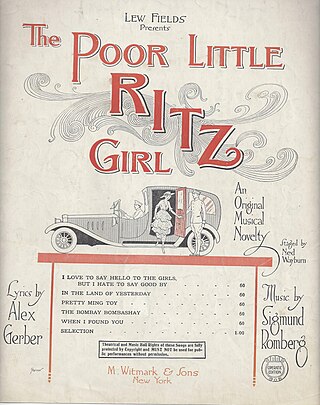
Poor Little Ritz Girl is a musical comedy in two acts, with book by George Campbell and Lew Fields. The show had some songs with lyrics by Alex Gerber and music by Sigmund Romberg and other songs with lyrics by Lorenz Hart and music by Richard Rodgers. The show was produced by Lew Fields at the Central Theatre. It opened on July 28, 1920.
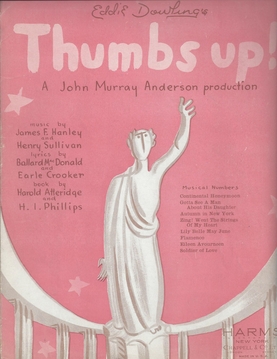
Thumbs Up! is a musical revue in two acts, with book by H. I. Phillips, Harold Atteridge, and Alan Baxter. The show had songs with lyrics by Ballard MacDonald and Earle Crooker and music by James F. Hanley and Henry Sullivan. Additional lyrics by Karl Stark, Ira Gershwin, John Murray Anderson, Irving Caesar, Jean Herbert, and Vernon Duke and additional music by Vernon Duke, Gerald Marks, and Steve Child. The show was produced by Eddie Dowling at the St. James Theatre. The revue opened on December 27, 1934.

Three's A Crowd is a 1930 Broadway revue with lyrics by Howard Dietz and others, and music by Arthur Schwartz and others. It was “put together” by Howard Dietz, and produced by Max Gordon.
Gates and Morange was a New York City based firm of designers and builders established in 1894 by brothers Frank E. Gates and Richard H. Gates, and the artist Edward A. Morange. The firm had a prolific career as scenic designers for Broadway from the 1890s through the 1930s; creating sets for more than 50 productions. The firm also created designs for trade shows, exhibitions, and businesses. While the organization's work as set designers ended after the mid 1930s, the firm continued to operate in other capacities until it closed in 1953.
















